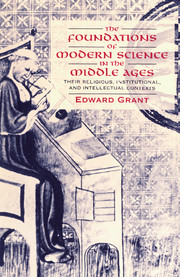 The Foundations of Modern Science in the Middle Ages
The Foundations of Modern Science in the Middle Ages Book contents
- Frontmatter
- Contents
- Preface
- 1 THE ROMAN EMPIRE AND THE FIRST SIX CENTURIES OF CHRISTIANITY
- 2 THE NEW BEGINNING: THE AGE OF TRANSLATION IN THE TWELFTH AND THIRTEENTH CENTURIES
- 3 THE MEDIEVAL UNIVERSITY
- 4 WHAT THE MIDDLE AGES INHERITED FROM ARISTOTLE
- 5 THE RECEPTION AND IMPACT OF ARISTOTELIAN LEARNING AND THE REACTION OF THE CHURCH AND ITS THEOLOGIANS
- 6 WHAT THE MIDDLE AGES DID WITH ITS ARISTOTELIAN LEGACY
- 7 MEDIEVAL NATURAL PHILOSOPHY, ARISTOTELIANS, AND ARISTOTELIANISM
- 8 HOW THE FOUNDATIONS OF EARLY MODERN SCIENCE WERE LAID IN THE MIDDLE AGES
- Notes
- Bibliography
- Index
4 - WHAT THE MIDDLE AGES INHERITED FROM ARISTOTLE
Published online by Cambridge University Press: 05 June 2012
- Frontmatter
- Contents
- Preface
- 1 THE ROMAN EMPIRE AND THE FIRST SIX CENTURIES OF CHRISTIANITY
- 2 THE NEW BEGINNING: THE AGE OF TRANSLATION IN THE TWELFTH AND THIRTEENTH CENTURIES
- 3 THE MEDIEVAL UNIVERSITY
- 4 WHAT THE MIDDLE AGES INHERITED FROM ARISTOTLE
- 5 THE RECEPTION AND IMPACT OF ARISTOTELIAN LEARNING AND THE REACTION OF THE CHURCH AND ITS THEOLOGIANS
- 6 WHAT THE MIDDLE AGES DID WITH ITS ARISTOTELIAN LEGACY
- 7 MEDIEVAL NATURAL PHILOSOPHY, ARISTOTELIANS, AND ARISTOTELIANISM
- 8 HOW THE FOUNDATIONS OF EARLY MODERN SCIENCE WERE LAID IN THE MIDDLE AGES
- Notes
- Bibliography
- Index
Summary
Aristotle's natural books formed the basis of natural philosophy in the universities, and the way in which medieval scholars understood the structure and operation of the cosmos must be sought in those books. By his use of assumptions, demonstrated principles, and seemingly self-evident principles, Aristotle imposed a strong sense of order and coherence on an otherwise bewildering world. Aristotle's medieval disciples, who formed the class of natural philosophers during the late Middle Ages, would eventually extend Aristotle's principles to activities and problems beyond anything that the philosopher himself had considered.
Aristotle was convinced that the world he sought to understand was eternal, without beginning or end. He regarded the eternity of the world as far less problematic than any assumption of a cosmic beginning that also implied a future end to the world. It was better to postulate eternity than be forced into an explanation that required an infinite regress of causal beginnings. The idea that matter could have a beginning seemed impossible to the ancient Greeks, for if one were to arrive at some alleged pristine matter, it would inevitably lead to the question of what caused it, and so on. Without a beginning, however, the world could not have been created, and thus Aristotle's ideas about the eternity of the world set him in opposition to the theologians of the great monotheistic religions of Judaism, Christianity, and Islam.
- Type
- Chapter
- Information
- The Foundations of Modern Science in the Middle AgesTheir Religious, Institutional and Intellectual Contexts, pp. 54 - 69Publisher: Cambridge University PressPrint publication year: 1996


